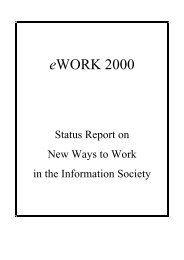Proceedings of 8th European Assembly on telework (Telework2001)
Proceedings of 8th European Assembly on telework (Telework2001)
Proceedings of 8th European Assembly on telework (Telework2001)
You also want an ePaper? Increase the reach of your titles
YUMPU automatically turns print PDFs into web optimized ePapers that Google loves.
36<str<strong>on</strong>g>European</str<strong>on</strong>g> perspectives <strong>on</strong> the knowledge society,Sessi<strong>on</strong> summarySessi<strong>on</strong> rapporteur Eero Polus,Labour Market Counsellor, Ministry <str<strong>on</strong>g>of</str<strong>on</strong>g> LabourPr<str<strong>on</strong>g>of</str<strong>on</strong>g>essor Franz Josef Radermacher addressed the issue <str<strong>on</strong>g>of</str<strong>on</strong>g> equity and sustainability from theglobal perspective. Many <str<strong>on</strong>g>of</str<strong>on</strong>g> the visi<strong>on</strong>s <strong>on</strong> global equity and sustainability have hitherto beendiscouraging (e.g. the scenario <str<strong>on</strong>g>of</str<strong>on</strong>g> the Club <str<strong>on</strong>g>of</str<strong>on</strong>g> Rome), but according to Radermacher there is hopethat ICT will give a new impetus to the emerging global social-ecological market ec<strong>on</strong>omy withdue instituti<strong>on</strong>al design. However, the positive developments cannot be taken for granted, because,in an unfavourable case, ICT could deepen the digital divisi<strong>on</strong> between countries and populati<strong>on</strong>groups. The social-ecological market ec<strong>on</strong>omy will provide a framework for the balanced evoluti<strong>on</strong><str<strong>on</strong>g>of</str<strong>on</strong>g> equity and sustainability.Radermacher noted that in the US debate, equity is generally perceived as an absolute c<strong>on</strong>cept. Inthe US, equity is paralleled to the ability to fulfil <strong>on</strong>e’s basic needs. In Europe, equity is mostlyseen in relative terms: for example, the poorest should have at least half <str<strong>on</strong>g>of</str<strong>on</strong>g> the average income.The Lorenz Curve and the Gini Coefficient are traditi<strong>on</strong>al tools for measuring inequality. On thebasis <str<strong>on</strong>g>of</str<strong>on</strong>g> these tools, Radermacher has developed an approximate social equity measure for eachcountry by using the probability approach. The lower the value <str<strong>on</strong>g>of</str<strong>on</strong>g> the indicator is, the betterthe equity is. Radermacher estimated that the equity value <str<strong>on</strong>g>of</str<strong>on</strong>g> the entire globe is roughly 3.5-4. The corresp<strong>on</strong>ding figure for Brazil is 3.60, for the USA 2.14, for Finland 1.63 and Sweden1.50. Radermacher regarded social equity as a source for ec<strong>on</strong>omic growth. He assessed thatthe equity value band 1.5- 2.3 is most propitious for growth. Highly inequitable societies arenot inherently stimulating growth, because the rich minority cannot create enough employmentthrough its spending to raise the standard <str<strong>on</strong>g>of</str<strong>on</strong>g> living <str<strong>on</strong>g>of</str<strong>on</strong>g> the poor majority.How can the poorer countries catch up? According to Radermacher, str<strong>on</strong>g and sustainableec<strong>on</strong>omic growth that takes into account global envir<strong>on</strong>mental c<strong>on</strong>straints is the prime mover inthe process. For catching up, a close to 10% steady annual growth is needed. Quadrupling earningswithin 20 years and distributing them in a more equitable way is another necessary c<strong>on</strong>diti<strong>on</strong>.A sufficient global co-financing is the third important element in the process. Maybe even up to3% <str<strong>on</strong>g>of</str<strong>on</strong>g> the global GDP needs to be redistributed <strong>on</strong> a worldwide basis. One possible instrumentfor that purpose could be a Tobin-type tax <strong>on</strong> short-term internati<strong>on</strong>al capital movements. Globalco-financing will not succeed without c<strong>on</strong>sensus and it will set the heaviest burden <strong>on</strong> the USA.ICT and knowledge-based producti<strong>on</strong> are important elements in the catch-up process, becausethey provide effective tools for giving momentum to ec<strong>on</strong>omic growth without endangeringenvir<strong>on</strong>mental sustainability.








